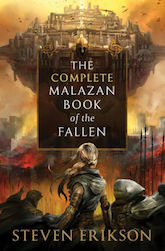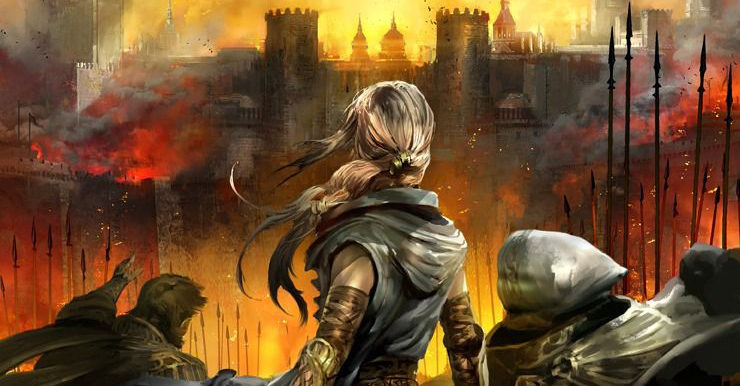By nature of the genre, the premise of every fantasy novel asks “what if” questions. What if magic was real? What if children went to school to learn it? What if a pantheon of gods walked among us? As an archeologist and anthropologist, Steven Erikson asked questions about the clashing of cultures and classes, about climate and capitalism, about the relationship between gods and mortals—and not just if magic existed, but if it was available to anyone. What if magical abilities could be learned by anyone, regardless of age, gender, intelligence or skill? As Erikson states, “It occurred to us that it would create a culture without gender bias so there would be no gender-based hierarchies of power. It became a world without sexism and that was very interesting to explore.”
In the same matter-of-fact, almost mundane way that magic simply exists in the Malazan universe, so too does equality among the sexes. It just is—and that’s refreshing.
With an egalitarian magic system as the foundation to the Malazan universe, the subsequent worldbuilding blocks logically fall into place, building upon each other and supporting that central idea. The definition of power extends beyond male physical strength, equalizing roles of authority. The availability of magical healing means less women and children dying in childbirth, and more opportunity for women to contribute to a society without medical or technological advancements. This creates an even playing field in the realm of power and influence, granting equal opportunity for everyone.
The very first magic user we meet in Gardens of the Moon is a woman. Another woman, Tattersail, is a respected sorceress who, although aged and overweight (“The fat lady with the spells” in her own words), enters a romantic relationship with the traditionally attractive male hero of the story. The Malazan Empire is ruled by Empress Laseen. Both her Adjuncts in the course of the series are women and one, Tavore Paran, is in a relationship with another woman. Throughout the books are storylines following sisters and female friendships, matriarchal societies, countless goddesses and queens, female assassins unmatched by their male peers, female pirate captains and several other women in high-ranking positions in different societies. And in a minor but fascinating detail, all military superiors in the series are addressed as “sir” regardless of gender. Erikson could have easily created a gendered honorific but he instead chose to keep “sir”, solidifying that, whether male or female, whoever holds the position is equally deserving of respect. And despite various cultural divisions that arise, these women in positions of power are never questioned by their male subordinates on the basis of their gender. Being female never equates with being seen as weak.
But this is the Book of the Fallen, after all. And though it’s a world of equality and diversity, it sure as Hood isn’t a utopia. Erikson presents his readers with some of the most reprehensible qualities of human nature—acts sometimes so degrading that it’s tempting to turn away. Horrible things happen to these characters, but it’s never driven by discrimination. Gender and sexual orientation are never used purely as plot devices. Of course Adjunct Tavore Paran is questioned and even resented by some of her soldiers, but using her gender or sexual orientation against her would never even cross their minds.
Neither would a common Malazan soldier hate her enemy simply because of their skin colour. Racism and blind hate certainly do exist within the series but it’s most often used as a foil to the diverse Malazan Empire, supporting the theme that diversity is strength. Inspired by the Roman Empire, Erikson explores themes of cultural and ethnic identity with his Malazans. The Malazan Empire doesn’t completely wipe out subjugated cultures, but incorporates them into their own (for better or worse). The Malazan armies are thus made of dozens of races, both human and non-human alike who, for the most part, manage to get along with each other. There’s significant effort made to show the racial diversity of the Malazan Empire, and the main themes of the series overwhelmingly express the idea that diversity is empowering.
Buy the Book


The Complete Malazan Book of the Fallen
“Diversity is worth celebrating,” says Malazan Imperial Historian, Duiker, “for it is the birthplace of wisdom.”
Diversity in a society brings wisdom and representation brings compassion. And this is what separates Malazan Book of the Fallen from the rest of fantasy. Steven Erikson has spoken at length about compassion being the main theme of his series. To feel compassionate to those who are suffering, we must first be made aware of their suffering. And throughout history, these suffering voices are always the ones least heard by the rest of the world—the forgotten, the outcast, the other. With a cast of characters diverse in their gender, culture and class, Erikson brings many of these unheard voices to the forefront of his work, challenging the reader’s worldview. How do we respond to suffering? How do we maintain cultural diversity while united under one country? How, in a world without Malazan’s magic, do we address the sexism of our own? For while fantasy often begins with a “what if” question, it usually ends with “what now?”
As far as representing every unheard voice in our society, these books aren’t perfect. Gender identity isn’t explored beyond a god who changes their biological sex at will (but with the thin lines dividing male and female roles in many of Erikson’s societies, there’s surely a place for those whose identity doesn’t perfectly align with one or the other). And while the gay male characters are few, their sexual orientation never puts them at a societal disadvantage. So often fantasy presents a perfectly reflective portrait of our own society to address its flaws rather than exploring an alternative. And while many of their contemporaries continue to write epic magic battles and fire-breathing dragons while defaulting to overtly sexist, heteronormative societies because of “historical accuracy”, Erikson has proved that worldbuilding that steps outside of a Eurocentric, patriarchal system can be used as a tool to promote and explore inherent diversity and equality—to show us what reality could look like. It’s a question that’s been asked before, but it’s worth repeating: if fantasy readers can suspend their disbelief to accept the existence of dragons, magic and zombies, shouldn’t they be able to stretch their imaginations far enough to embrace a world where women and minorities exist as active, accepted, and truly equal members of society?
 Matt Bandstra is a writer and designer whose poetry collection, Birds in Aquariums, was published in 2018. He can be found sharing art on Instagram and talking about music and the environment on Twitter.
Matt Bandstra is a writer and designer whose poetry collection, Birds in Aquariums, was published in 2018. He can be found sharing art on Instagram and talking about music and the environment on Twitter.











I’m hoping we’re nearly done with “historical accuracy” being used as an excuse to avoid fully-realizing a fantasy world. Media that leans on escapism for suspension of disbelief need not be blandly “real” for the sake of giving us an easily swallowed pill of familiarity. Worldbuilding should extend to all facets of fantastical writing — especially those that actively mirror their readers — as many look to these types books to find an ideal world to begin building outside its pages. Great work, Matt! Can’t wait to read more from you!
This is one of my all time favorite series because it breaks many boundaries philosophically, and goes so deep. The gender neutral aspect of this world is SO refreshing!!!
Nice reminder of what makes this series great, I really enjoyed the diversity of the cast.
As a side effect of it being so well realized (yes I realize I am odd, and strange things get into my head), your use of “it sure as Hood isn’t a utopia” got into my head because it didn’t fit. Hood was usually used as a curse (“Hood’s balls”, “Hood’s breath”, etc.) but “sure as Hood” I don’t think ever was. This series produced so many wonderful, colorful, curses and that was also part of what made it fun.
The best suggestion I have is “it sure as the Abyss isn’t a utopia”
This seems to be a rehash of some of the key themes in this two-year-old post:
https://thecriticaldragon.com/2016/03/22/worldbuilding-and-the-malazan-book-of-the-feminist/
Perhaps Matt Bandstra on Tor.com is also RibaldRemark on The Critical Dragon?
@TedThePenguin
If you follow the logic of Malazan curses, you should probably go with “sure as Oponn”…
The best sci-fi is a reflection of our society, while the best fantasy tends to play with the same themes and tropes. The foreign invader orcs fought back by a noble white guy is all too appealing to those that see their fellow human beings as animals. Erikson paints every ”other” as complex and fully realized – it’s so hard to find archetype villains in this series. Erikson doesn’t dehumanize the enemies and give us an easy hero to root for. Empires leave pain and death in their wake, and often are replaced by another. The only thing I’d wish Erikson had tackled a bit more was top down politics vs Democratic forms of rule. Rule is top down versus Democratic, but maybe that is the point – society ruled by a few inevitably turns to war, while good people pay the price. Ultimately it is hard to find fantasy that embraces democracy and collectivism, and even scratches the surface of financial hardships as a result of political hegemony.
@TedThePenguin I knew there was a reason “sure as Hood” was in my head and a quick search on searchofthefallen.com gave three uses – though I still applaud your knowledge and respect of Malazan curses
what I love about the books is, if you’re an a-hole, your an a-hole…not because of gender, wealth, color, rank, race or religion…none of the things that people use to seperate themselves from others…skin color, like beauty, is only skin deep…a-hole goes to the bone
I’ve long considered reading this series, but what little reading time I have these days coupled with how daunting the series seems (and how daunting most articles make it seem) has kept me from doing so. This is the first time an article has made me want to.
@shiznatikus I honestly consider the Malazan series to be the ‘master class’ of reading in the epic fantasy genre. There will always be a place in my heart for series like The Wheel of Time or the Stormlight Archives, but The Book of the Fallen just blows them out of the water for complexity and “realness” and sheer value (imo). Every character is engaging (even when their lives are short), every viewpoint is worth seeing (even if they are often horrific), every story is fully realized (even if it isn’t impactful in the grand scheme of things). To me it reads more like a true history of another world seen through the eyes of a fallible and prolific observer than any other entry in the same category to date.